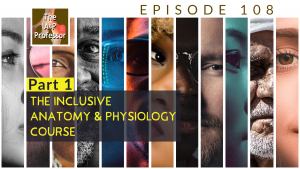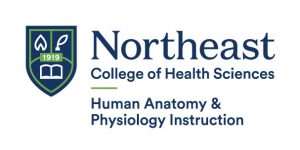As anatomy and physiology faculty, we put a lot of effort into developing strategies for learning the core concepts of human biology. It's easy to forget to build in some inclusive strategies that help all students grow and succeed. In this first of two episode, host Kevin Patton begins a list of simple and effective ways to make our A&P course more inclusive.
00:00 | Introduction
00:46 | The Inclusive Course
04:45 | 1. Reflect Diversity
12:21 | 2. Accessible Resources
21:06 | Sponsored by AAA
21:52 | 3. Inclusive Syllabus
26:03 | 4. Use Inclusive Language
30:25 | Sponsored by HAPI
31:30 | 5. Gender Pronouns
34:09 | 6. Use Preferred Names
40:47 | Sponsored by HAPS
41:40 | 7. Small Group Introductions
46:26 | Staying Connected
★ If you cannot see or activate the audio player, go to: theAPprofessor.org/podcast-episode-108.html
🏅 Apply for your credential (badge/certificate) for listening to this episode: theAPprofessor.org/podcast-episode-108.html/#badge
❓ Please take the anonymous survey: theAPprofessor.org/survey
☝️ Questions & Feedback: 1-833-LION-DEN (1-833-546-6336)
✔️ Follow The A&P Professor on Twitter, Facebook, Blogger, Revue, Tumblr, or Instagram! @theAPprofessor
📰 Get the almost-daily TAPP Science & Education Updates theAPprofessor.org/updates
Inclusive, good-quality education is a foundation for dynamic and equitable societies. (Desmond Tutu)
The Inclusive Course
4 minutes
This episode—and the next one—discuss a large basket of practical ways we can make our anatomy and physiology course more inclusive.
★ Association of College & University Eductators (AUCE) toolkit (various resources for the inclusive course) AandP.info/inclusive-teaching-6be1c1
★ ADVANCING DIVERSITY AND INCLUSION IN HIGHER EDUCATION (report on benefits of making courses inclusive) AandP.info/8879cb
1. Reflect Diversity
7.5 minutes
Think about how we can reflect diversity in our society and in our world.
★ AUCE toolkit #1 (resources related to this tip) AandP.info/inclusive-teaching-da7061
★ Finding Media | Images and More for Teaching Anatomy & Physiology
★ Mind The Gap: Black and Brown Skin (example from the TAPP Finding Media page) AandP.info/mind-gap-b1b44b
2. Accessible Resources
7.5 minutes
Are our resources accessible to all students—and not just those students in our course right now?
★ AUCE toolkit #2 (resources related to this tip) AandP.info/inclusive-teaching-cf24ea
★ Episode page transcript link (for this episode) theAPprofessor.org/podcast-episode-108.html#episode-transcript
★ TAPPapp | The Free App for Listening to The A&P Professor podcast (each episode has an embedded transcript)
★ The A&P Professor at ListenNotes.com (time-coded transcript of each episode available) AandP.info/TAPPlistennotes
Sponsored by AAA
1 minute
A searchable transcript for this episode, as well as the captioned audiogram of this episode, are sponsored by the American Association for Anatomy (AAA) at anatomy.org.
Don't forget—HAPS members get a deep discount on AAA membership!
3. Inclusive Syllabus
4 minutes
Are there opportunities in our syllabus to be more inclusive?
★ AUCE toolkit #3 (resources related to this tip) https://aandp.info/inclusive-teaching-4e7522
★ The Syllabus Special | TAPP 75 (includes discussion of Test Zero)
★ Diversity Statement On a Syllabus (one of many how-to articles available to help you) AandP.info/diversity-statement-ee204a
★ Kevin's syllabus (my Pre-A&P syllabus has a number of features that promote inclusion; did I miss something? If so, let me know!) lionden.com/fis.htm
★ Kevin's pronoun page (every time I use (he/him), including my syllabus, I link it to this page) lionden.com/pronouns.htm
4. Use Inclusive Language
4.5 minutes
Our language is evolving to be more inclusive—both in science and in society at large. Keeping up with and using inclusive language makes our course more inclusive.
★ AUCE toolkit #4 (resources related to this tip) AandPaandp.info/inclusive-teaching-99dda9
★ Doing the Work of Diversity, Equity, and Inclusion (my essay on inclusion in textbboks) AandP.info/935b73
Sponsored by HAPI Online Graduate Program
1 minute
The Master of Science in Human Anatomy & Physiology Instruction—the MS-HAPI—is a graduate program for A&P teachers, especially for those who already have a graduate/professional degree. A combination of science courses (enough to qualify you to teach at the college level) and courses in contemporary instructional practice, this program helps you be your best in both on-campus and remote teaching. Kevin Patton is a faculty member in this program at Northeast College of Health Sciences. Check it out!
5. Gender Pronouns
2.5 minutes
Using our preferred gender pronouns invites students to be their authentic selves in our course.
★ AUCE toolkit #5 (resources related to this tip) https://aandp.info/inclusive-teaching-040d88
★ More on Eponyms in A&P Terminology | Episode 41 (episode where I discuss preferred pronouns)
★ Kevin's pronoun page (every time I use (he/him) I link it to this page) lionden.com/pronouns.htm
6. Use Preferred Names
6.5 minutes
Using a student's preferred name—not necessarily the one on the roster and not necessarily the version can can pronounce more easily—values a student's personal identity and therefore improves inclusion in our course. Preferred pronunciation of their name is important, too.
★ AUCE toolkit #6 (resources related to this tip) AandP.info/inclusive-teaching-e8c082
Ep 41
★ More on Eponyms in A&P Terminology | Episode 41 (episode where I discuss using personal names)
Sponsored by HAPS
1 minute
The Human Anatomy & Physiology Society (HAPS) is a sponsor of this podcast. You can help appreciate their support by clicking the link below and checking out the many resources and benefits found there. Watch for virtual town hall meetings and upcoming regional meetings!
7. Small Group Introductions
5 minutes
Starting the course with opportunities for students to introduce themselves in small groups can jumpstart the building of an inclusive course culture.
★ AUCE toolkit #7 (resources related to this tip) https://aandp.info/inclusive-teaching-e08b9e
★ The Syllabus Special | TAPP 75 (where I describe my first-day, small-group introduction activity)
If the hyperlinks here are not active, go to TAPPradio.org to find the episode page.
★ More details at the episode page: theAPprofessor.org/podcast-episode-108.html
★ Transcript available in the transcript box: theAPprofessor.org/podcast-episode-108.html
★ Need help accessing resources locked behind a paywall? Check out this advice from Episode 32 to get what you need! my-ap.us/paywall
Take The A&P Professor experience to the next level!
★ theAPprofessor.org/community
Earn cash by referring other A&P faculty to this podcast:
Tools & Resources
★ TAPP Science & Education Updates: theAPprofessor.org/updates
★ Amazon: amzn.to/2r6Qa3J
★ Text Expander: theapprofessor.org/textexpander
★ Rev.com: try.rev.com/Cw2nZ
★ Snagit & Camtasia: techsmith.pxf.io/9MkPW
★ Krisp Free Noise-Cancelling App: theAPprofessor.org/krisp
★ JotForm (build forms for free): theAPprofessor.org/jotform
★ The A&P Professor Logo Items: https://www.teepublic.com/stores/the-a-p-professor
Sponsors
★ Transcript and captions for this episode are supported by the American Association for Anatomy | anatomy.org
★ The Human Anatomy & Physiology Society provides marketing support for this podcast | theAPprofessor.org/haps
★ Distribution of this episode is supported by the Northeast College of Health Sciences online graduate program in Human Anatomy & Physiology Instruction (HAPI) | northeast.edu/hapi
Clicking on sponsor links helps let them know you appreciate their support of this podcast!
Follow The A&P Professor on Twitter, Facebook, Blogger, Revue, Tumblr, or Instagram @theAPprofessor
The A&P Professor® and Lion Den® are registered trademarks of Lion Den Inc. (Kevin Patton)
As an Amazon Associate I earn from qualifying purchases. I may be compensated for links to sponsors and certain other links.
Click here to listen to this episode—or access the detailed notes and transcript.





No comments:
Post a Comment